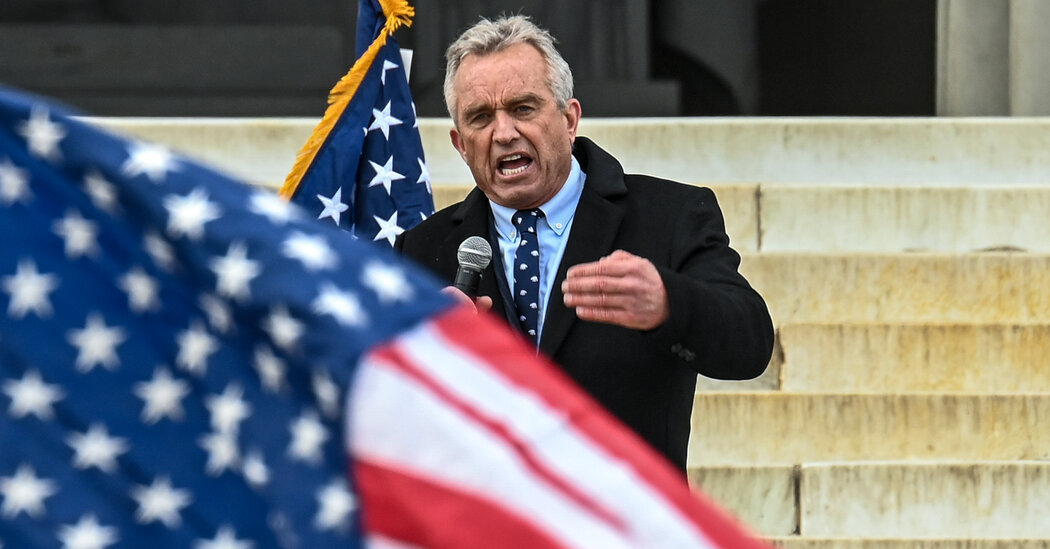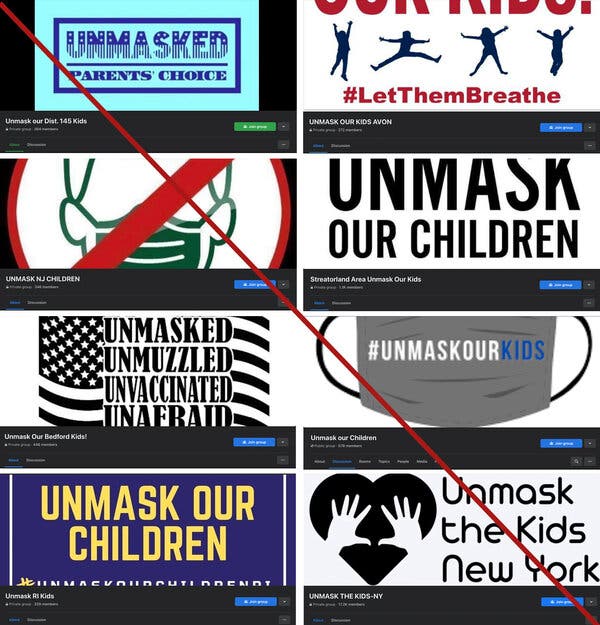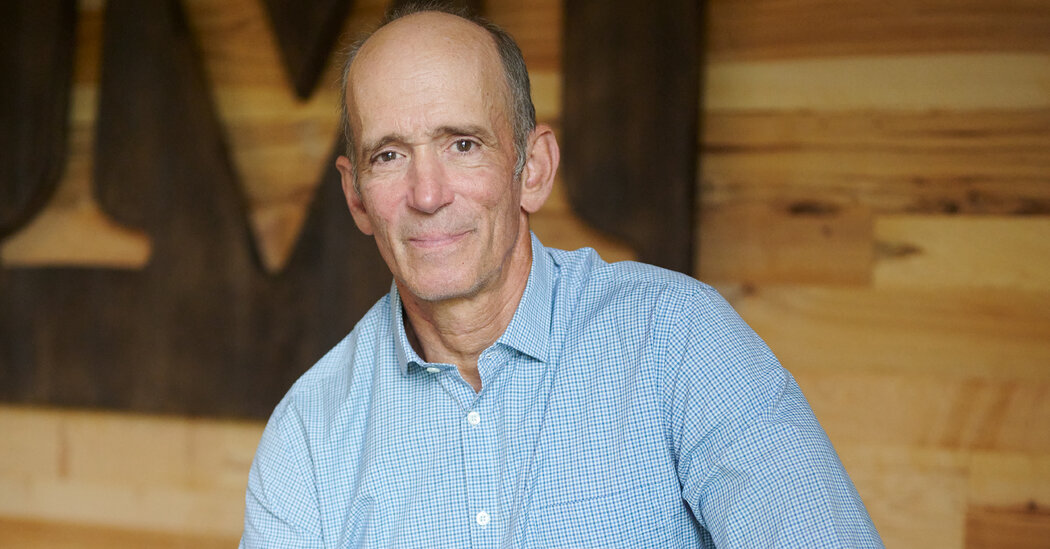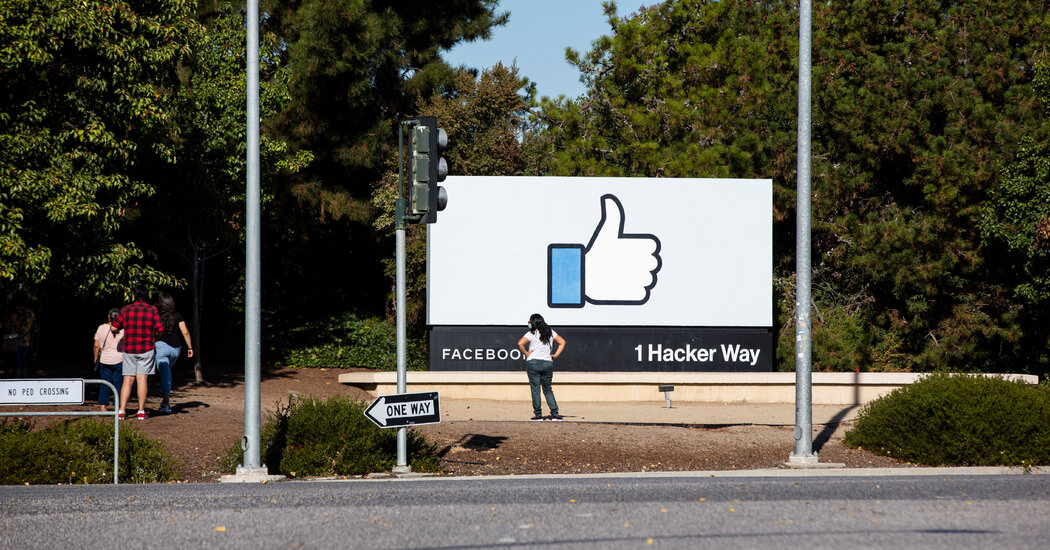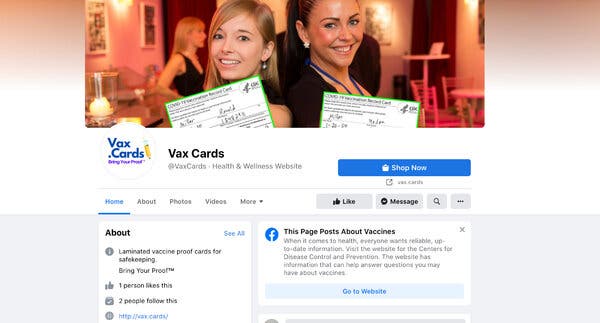ORINDA, Calif. — They waved signs that read “Defeat the mandates” and “No vaccines.” They chanted “Protect our kids” and “Our kids, our choice.”Almost everyone in the crowd of more than three dozen was a parent. And as they protested on a recent Friday in the Bay Area suburb of Orinda, Calif., they had the same refrain: They were there for their children.Most had never been to a political rally before. But after seeing their children isolated and despondent early in the coronavirus pandemic, they despaired, they said. On Facebook, they found other worried parents who sympathized with them. They shared notes and online articles — many of them misleading — about the reopening of schools and the efficacy of vaccines and masks. Soon, those issues crowded out other concerns.“I wish I’d woken up to this cause sooner,” said one protester, Lisa Longnecker, 54, who has a 17-year-old son. “But I can’t think of a single more important issue. It’s going to decide how I vote.”Ms. Longnecker and her fellow objectors are part of a potentially destabilizing new movement: parents who joined the anti-vaccine and anti-mask cause during the pandemic, narrowing their political beliefs to a single-minded obsession over those issues. Their thinking hardened even as Covid-19 restrictions and mandates were eased and lifted, cementing in some cases into a skepticism of all vaccines.Nearly half of Americans oppose masking and a similar share is against vaccine mandates for schoolchildren, polls show. But what is obscured in those numbers is the intensity with which some parents have embraced these views. While they once described themselves as Republicans or Democrats, they now identify as independents who plan to vote based solely on vaccine policies.Their transformation injects an unpredictable element into November’s midterm elections. Fueled by a sense of righteousness after Covid vaccine and mask mandates ended, many of these parents have become increasingly dogmatic, convinced that unless they act, new mandates will be passed after the midterms.To back up their beliefs, some have organized rallies and disrupted local school board meetings. Others are raising money for anti-mask and anti-vaccine candidates like J.D. Vance, the Republican nominee for Senate in Ohio; Reinette Senum, an independent running for governor in California; and Rob Astorino, a Republican gubernatorial candidate in New York.In interviews, 27 parents who called themselves anti-vaccine and anti-mask voters described strikingly similar paths to their new views. They said they had experienced alarm about their children during pandemic quarantines. They pushed to reopen schools and craved normalcy. They became angry, blaming lawmakers for the disruption to their children’s lives.Many congregated in Facebook groups that initially focused on advocating in-person schooling. Those groups soon latched onto other issues, such as anti-mask and anti-vaccine messaging. While some parents left the online groups when schools reopened, others took more extreme positions over time, burrowing into private anti-vaccine channels on messaging apps like WhatsApp and Telegram.Eventually, some began questioning vaccines for measles and other diseases, where inoculations have long been proven effective. Activists who oppose all vaccines further enticed them by joining online parent groups and posting inaccurate medical studies and falsehoods.“So many people, but especially young parents, have come to this cause in the last year,” said Janine Pera, 65, a longtime activist against all vaccines who attended the Orinda protest. “It’s been a huge gift to the movement.”The extent of activity is evident on Facebook. Since 2020, more than 200 Facebook groups aimed at reopening schools or opposing closings have been created in states including Texas, Florida and Ohio, with more than 300,000 members, according to a review by The New York Times. Another 100 anti-mask Facebook groups dedicated to ending masking in schools have also sprung up in states including New Jersey, New York and Connecticut, some with tens of thousands of members.Since the outbreak of Covid-19, many Facebook groups have sprung up opposing mask mandates.Renée DiResta, a research manager at the Stanford Internet Observatory who has studied anti-vaccine activism, said the movement had indoctrinated parents into feeling “like they are part of their community, and that community supports specific candidates or policies.”Their emergence has confounded Republican and Democratic strategists, who worried they were losing voters to candidates willing to take absolute positions on vaccines and masks.“A lot of Democrats might think these voters are now unreachable, even if they voted for the party recently,” said Dan Pfeiffer, a Democratic political adviser to former President Barack Obama.Read More on Facebook and MetaA New Name: In 2021, Mark Zuckerberg announced that Facebook would change its name to Meta, as part of a wider strategy shift toward the so-called metaverse that aims at introducing people to shared virtual worlds.Morphing Into Meta: Mr. Zuckerberg is setting a relentless pace as he leads the company into the next phase. But the pivot is causing internal disruption and uncertainty.Zuckerberg’s No. 2: In June, Sheryl Sandberg, the company’s chief financing officer announced she would step down from Meta, depriving Mr. Zuckerberg of his top deputy.Tough Times Ahead: After years of financial strength, the company is now grappling with upheaval in the global economy, a blow to its advertising business and a Federal Trade Commission lawsuit.Nathan Leamer, who worked at the Federal Communications Commission during the Trump administration and is now vice president of public affairs at the firm Targeted Victory, said Republican candidates — some of whom have publicly been against Covid vaccine mandates — were better positioned to attract these voters. He pointed to last year’s surprise win in Virginia of Gov. Glenn Youngkin, a Republican, after he gained the support of young parents by invoking their frustration over Covid-driven school closures.Even so, Mr. Leamer said, these parents were a wild card in November. “The truth is that we don’t really know what these voters will do,” he said.‘I Found My People’Natalya Murakhver, 50, once considered herself a Democrat who prioritized environmental and food sustainability issues. Sam James, 41, said he was a Democrat who worried about climate change. Sarah Levy, 37, was an independent who believed in social justice causes.That was before the pandemic. In 2020, when the coronavirus swept in and led to lockdowns, Ms. Murakhver’s two daughters — Violet, 5, and Clementine, 9 — climbed the walls of the family’s Manhattan apartment, complaining of boredom and crying that they missed their friends.In Chicago, Mr. James’s two toddlers developed social anxiety after their preschool shuttered, he said. Ms. Levy said her autistic 7-year-old son watched TV for hours and stopped speaking in full sentences.“We were seeing real trauma happening because programs for children were shut down,” said Ms. Levy, a stay-at-home mother in Miami.But when they posted about the fears for their children on Facebook, Instagram or Twitter, they were told to stop complaining, they said. Other parents called them “selfish” and “whiny.” Alienated, they sought other like-minded parents online.Many found a community on Facebook. New groups, mostly started by parents, were rapidly appearing on the social network, with people pushing for schools to reopen. In California, 62 Facebook groups dedicated to reopening or keeping elementary schools open popped up late last year, according to a review by The Times. There were 21 such groups in Ohio and 37 in New York. Most ranged in size from under 100 members to more than 150,000.Facebook, which is owned by Meta, declined to comment.The company has removed groups that spread misinformation about Covid-19 and vaccines.“We couldn’t stand by and watch our children suffer without their friends and teachers,” said Natalya Murakhver, a mother of two.Marko Dukic for The New York TimesMs. Murakhver joined some Facebook groups and became particularly active in one called “Keep NYC Schools Open,” which petitioned the city to open schools and keep them open through Covid surges. Last year, she became a group administrator, helping to admit new members and moderating discussions. The group swelled to 2,500 members.“We had the same cause to rally behind,” Ms. Murakhver said. “We couldn’t stand by and watch our children suffer without their friends and teachers.”In Chicago, Mr. James joined two Facebook groups pushing Chicago schools to reopen. In Miami, Ms. Levy jumped into national Facebook groups and discussed how to force the federal government to mandate that schools everywhere reopen.“I found my people,” Ms. Levy said. While she had been an independent, she said she found common ground with Republicans “who understood that for us, worse than the virus, was having our kid trapped at home and out of school.”Into the Online Rabbit HoleThe Facebook groups were just the beginning of an online journey that took some parents from more mainstream views of reopening schools toward a single-issue position.In Chico, Calif., Kim Snyder, 36, who has a 7-year-old daughter and 9-year-old son, said she was a longtime Republican. After her children had to stay home in the pandemic, she helped create a Facebook group in 2020 for Chico parents committed to reopening schools full-time.At the time, her local schools had partially reopened and children were learning both online and in-person, Ms. Snyder said. But frustration over hybrid learning was mounting, and schools were repeatedly shut down when Covid surged.By mid-2021, Ms. Snyder’s Facebook group had splintered. Some parents were satisfied with the safety measures and hybrid learning and stopped participating in online discussions, she said. Others were angry that they had not returned to a prepandemic way of living.Protesters demanded the removal of the indoor mask mandate for the Los Angeles Unified School District in March.Caroline Brehman/EPA, via ShutterstockMs. Snyder counted herself in the latter category. She channeled her discontent by attending in-person protests against mask requirements at public schools. At the rallies, she met activists who opposed all types of vaccines. She invited some to join her Facebook group, she said, “because we were all fighting for the same thing. We wanted a return to normalcy.”The focus of her Facebook group soon morphed from reopening schools to standing against masks in schools. By late last year, more content decrying every vaccine had also started appearing in the Facebook group.“I started to read more about how masks and vaccines were causing all this damage to our kids,” Ms. Snyder said.Scientific advisers to the Centers for Disease Control and Prevention have said the Pfizer-BioNTech and Moderna coronavirus vaccine shots are considered safe for young children. But Ms. Snyder said she became convinced they were wrong. She browsed other Facebook groups too, to meet more parents with similar beliefs.Activists posted statistics about Covid vaccines in those Facebook groups. Often that information came from the Vaccine Adverse Event Reporting System, a database maintained by the C.D.C. and the Food and Drug Administration, which allows anyone to submit data. The C.D.C. has warned that the database “cannot prove that a vaccine caused a problem.”Yet in a September 2021 post in Ms. Snyder’s Facebook group, parents pointed to VAERS figures that they said showed thousands of vaccine-induced deaths.“This is absolutely dangerous!” one parent wrote. “This hasn’t been really tested and is NOT NECESSARY….OMG!”Another post titled “If you want to really know what is going on, read this” linked to an article that falsely claimed vaccines could leave children sterile. The article was originally posted to a Facebook group named Children’s Health Defense, which supports an organization founded and chaired by the anti-vaccine activist Robert F. Kennedy Jr.That tipped some parents into repudiating every vaccine, from chickenpox to hepatitis, and against vaccine mandates of any kind. A right to self-determination so that parents could decide what vaccines their children took was paramount.“For the first time, I began to look at the statistics and questioned whether all the vaccines I had previously given my kids made sense,” Ms. Snyder said.Soon she joined explicitly anti-vaccine Facebook groups that activists linked to, including ones supporting Children’s Health Defense. In those forums, parents seethed at the authorities, arguing they had no right to tell them what to do with their children’s bodies. Activists posted other links to Twitter and Telegram and urged parents to join them there, warning that Facebook often removed their content for misinformation.One link led to a Telegram channel run by Denise Aguilar, an anti-vaccine activist in Stockton, Calif. Ms. Aguilar, who speaks about her experiences as a mother on social media and on conservative podcasts, also runs a survivalist organization called Mamalitia, a self-described mom militia. She has more than 100,000 followers across her TikTok and Telegram channels.Early in the pandemic, Ms. Aguilar posted conspiracy theories about the coronavirus’s origins and questioned the effectiveness of masking. Now her messaging has changed to focus on political activism for the midterms. Denise Aguilar, right, an anti-vaccine activist, joined other activists in blocking the door to Gov. Gavin Newsom’s office in Sacramento in September 2019.Rich Pedroncelli/Associated PressIn June, Ms. Aguilar encouraged her Telegram followers to vote for Carlos Villapudua, a Democrat running for California State Assembly who voted against a bill that would let children aged 12 and older get vaccinated without parental consent.“Patriots unite!” wrote Ms. Aguilar, who didn’t respond to a request for comment. “We need to support freedom loving Americans.”From Talk to ActionBy late last year, the talk among parent groups on Facebook, Telegram and Instagram had shifted from vaccine dangers to taking action in the midterms.Ms. Snyder said her involvement against vaccines would “100 percent determine” whom she voted for in November. She said she was disappointed in Gov. Gavin Newsom of California, a Democrat who encouraged masking and promoted the coronavirus vaccines.In New York, Ms. Murakhaver, who previously supported candidates who favored strong environmental protection laws, said she would vote based solely on a candidate’s position on mandates on all children’s vaccines.The Facebook group she helped operate, Keep NYC Schools Open, has shut down. But Ms. Murakhaver remains close with activists she met through the group, chatting with them on Signal and WhatsApp. While her children were vaccinated against measles and other diseases when they were babies, she now opposes any mandate that would force other parents to inoculate their children.“I’m a single-issue voter now, and I can’t see myself supporting Democratic Party candidates unless they show they fought to keep our kids in school and let parents make decisions about masks and vaccines,” she said, adding that she prefers Mr. Astorino for New York governor over the Democratic incumbent, Kathy Hochul.While states including California have deferred bills requiring Covid-19 vaccines for students attending public schools, many parents said they worried the mandates would be passed after the midterms.“If we don’t show up and vote, these bills could come back in the future,” Ms. Snyder said.A “Defeat the Mandate” rally in April to protest vaccine mandates.Damian Dovarganes/Associated PressAt the Orinda demonstration in April, more than 50 people gathered outside the office of Steve Glazer, a Democratic state senator to oppose coronavirus vaccine mandates.One was Jessica Barsotti, 56, who has two teenagers and was at her first rally. Previously a Democrat, Ms. Barsotti said elected officials had let her family down during the pandemic and planned to cast her ballot in November for candidates who were against vaccine mandates.“If that is Republicans so be it. If it is independents, fine,” she said. “I’m not looking at their party affiliation but how they fall on this one issue. It’s changed me as a person and as a voter.”
Read more →

